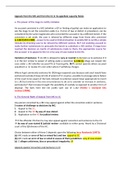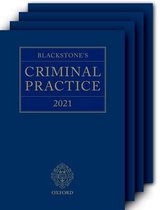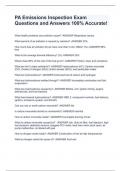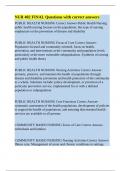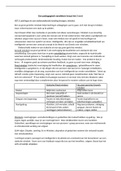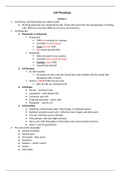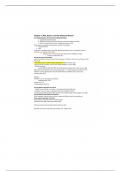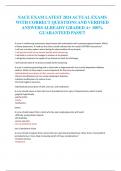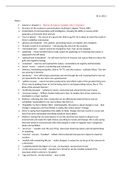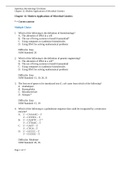Appeals from the MC and from the CC in its appellate capacity Notes
a. The power of the mags to rectify mistakes
An accused convicted in a MC (whether a GP or finding of guilty) can make an application to
ask the mags to set the conviction aside (i.e. if error of law or defect in procedure)- can be
considered by the same magistrates who convicted the accused or by a different bench. If the
conviction is set aside, the case is reheard by different mags from those who convicted
(s.142(2) MCA 1980) – power to be used in limited situation to enable MC to rectify a simple
mistake by directing case to be reheard by different justices. BUT not enabling accused to
make further submissions to persuade the bench to substitute a NG verdict; if mags have
reached the decision on merits of submissions made to them, the appropriate course for
the accused is to appeal to the CC or by way of case stated to the HC.
Variation of Sentence → An MC is allowed to vary or rescind its decision as to sentence if it
is in the IOJ- similar to power of setting aside a conviction (s.142(1)). Mags can reopen the
case under s.142 whether accused PG or found guilty. BUT: cannot operate where accused
acquitted i.e. to revoke D’s cost order where P withdrew charges.
Where A got community sentence for DD/mags reopened case because said court would have
sentenced custody if knew all info of extent of V’s injuries- possible to envisage where failure
of the court to be aware of the facts relevant to sentence would mean appropriate to resort
to s.142 but only be in the rare circumstances to do so to consider an increase in sentence,
particularly if that increase brought the possibility of custody as opposed to another form of
disposal. The facts here did not justify such use of s.142 (Holme v Liverpool City
Justices [2004]).
b. The General Right of Appeal from MC to CC
Any person convicted by a MC may appeal against either the conviction and/or sentence.
3 routes of challenge to decisions by MC:
1. Appeal to the CC;
2. Appeal to the HC by way of case stated;
3. Application to the HC for judicial review.
→ If the offender PG then he may also appeal against conviction and sentence to the CC.
→ by way of case stated & judicial review= available to either party. Heard by a Divisional
court of the QB division of the HC.
Choice between either of these 3 depends upon the following (ex p Rowlands [1997]):
(a) MC made an error of fact or mixed fact and law: appeal to CC
(b) MC made an error of law or acted in excess of their jurisdiction: way of case stated
(c) D alleges unfairness, bias or procedural irregularity: JR
Appeals against Conviction and Sentence in CC
,CrimPR. 34.7 → widened now to cover applications beyond new evidence i.e. about case
management or question of procedure, or the introduction or admissibility of evidence, or
any other question of law that has not been determined before the appeal hearing.
An appeal from the YC must be heard by a CC judge/recorder sitting with two lay justices (one
man and one woman) authorised to sit in the YC. Exceptionally, the CC may include only one
justice of the peace and need not include both a man and a woman if the presiding judge
decides that the hearing of the appeal will otherwise be unreasonably delayed or one or more
of the justices who started hearing the appeal is absent (r. 34.11(1) and (2)).
c. The procedure in the CC for dealing with the appeal
Notice of appeal is required to be given in writing to the relevant MC officer and every other
party within 21 days of sentence being passed or sentence being deferred (CrimPR 34.2(1)
and (3)) – even if that is after the date of conviction. If a notice is served within time, no
leave to appeal is required. Notice of an application to introduce evidence i.e. BC, sexual
history, hearsay or use of SM- must be made not more than 14 days after service of the
appeal notice (34.7). The CC may allow an appeal notice to be in a form other than the
specified form, or to be presented orally. (r. 34.10(d)).
NOTICE SHOULD STATE-
• Whether the appeal is against conviction/sentence or an order/failure to make order
• Summarise the issues and in an appeal against conviction
• Specify the W’s who the appellant wants to question
• State how long the trial lasted in the MC and how long the appeal is likely to take.
In an appeal against a finding the appellant insulted someone or interrupted proceedings - the
MC written findings of fact and the appellant's response to those findings must be attached
to the notice. The notice must also stipulate whether the appellant has asked MC to
reconsider the case and identify all those whom the notice has been served.
An application for an extension of time must be served with the appeal notice and must
explain why the appeal notice is late (r. 34.3). The CC may shorten or extend (even after it
has expired) any time-limit under part 34 (r. 34.10(a)).
Hearing
The appeal proceeds by way of complete rehearing (s.79(3) SCA). An appeal is heard by a CJ
or recorder who must normally sit with two lay magistrates who were not involved with the
original proceedings (s74 SCA).
At an appeal against conviction, the R’s counsel (the prosecution) makes an opening speech
and calls evidence, after which the appellant’s counsel may make a submission of no case to
answer. If that fails, defence evidence is called, counsel makes a closing speech, and the court
announces its decision. The parties may call evidence which has only become available to
them since the trial, or evidence they decided not to use in the MC.
, The information on which the appellant was convicted may not be amended by the CC i.e.
cannot allow P to amend the info in respect of the date of the alleged offences AND CC cannot
strike out an amendment made by the mags.
An appeal against sentence is a fresh sentencing hearing. P open the facts and antecedents
of the appellant, and D counsel then mitigates. The court then decides the sentence. When
dealing with an appeal against sentence, the CC should not ask itself whether the sentence
was within the discretion of the mags (as would be the appropriate question in JR) but should
consider whether the sentence passed by the mags was the correct one.
If what the court thinks is the appropriate sentence differs significantly from the sentence
imposed by the mags, the appeal should be allowed and the sentence of the CC substituted.
The CC is not entitled to increase the sentence on appeal from the MC on the basis that the
magistrates ought to have committed the offender to the CC for sentence in the first place.
d. The powers of the CC on appeal
The decision of the CC may be a majority decision- so the lay justices can out-vote the judge.
BUT the lay justices must accept any decisions on Q’s of law made by the judge.
Following an appeal from the MC, the CC may… (s. 48(2)).
(a) Confirm, reverse or vary any part of the decision appealed against, including a
determination not to impose a separate penalty in respect of an offence- cannot
increase max sentence beyond the max which the MC could have passed.
(b) Remit the matter with its opinion thereon to the authority whose decision is appealed
against- e.g. in the case of an equivocal plea
(c) Make such other order as the court thinks just, and by such order exercise any power
which the said authority might have exercised.
If the appeal is against a conviction or a sentence, the preceding provisions of this section shall
be construed as including power to award any punishment, whether more or less severe
than that awarded by the MC, if that is a punishment which that MC might have awarded
(s.48(4)). Applies whether the appeal is against the whole of the decision (s.48(5))
Also:
The appellant may abandon his appeal by giving written notice to the MC, appropriate officer
of the CC and the prosecution and to any other party to the appeal (r. 34.9(1)(a)). The appeal
may be abandoned without permission if done before the hearing commences- if started, the
appeal may be abandoned only with the permission of the CC.
As with a notice of appeal, the CC may allow the notice of abandonment to be given in a form
other than that specified or to be given orally. CC has a discretion to award costs in an appeal
from a MC in all cases- even where a timely notice of abandonment has been served.
An appeal cannot be abandoned by an appellant failing to attend or instruct an advocate.
Upon the abandonment of an appeal, the CC has no power to increase sentence nor to
reinstate appeal unless the abandonment was a nullity.

